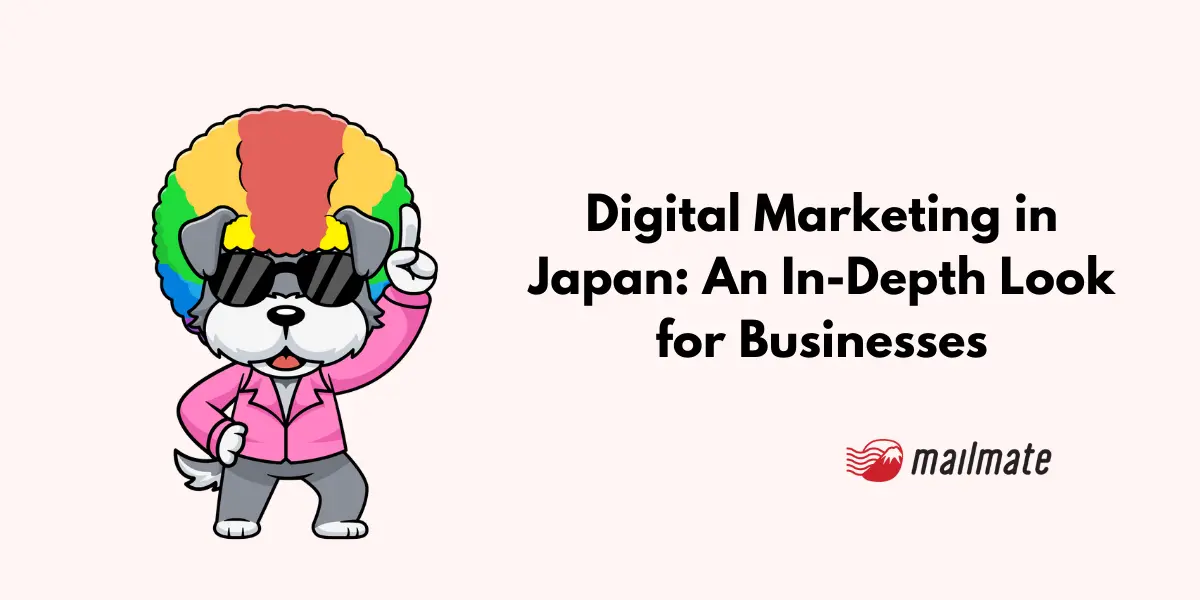Digital Marketing in Japan: An In-Depth Look for Businesses

Digital trends are changing. However, try-and-try methods will always reach new customers and increase your brand awareness.
Here, we take an overview look at the different types of digital marketing in Japan and their trends so you can gain an advantage in the Japanese digital market.
Challenges for foreign brands entering the Japanese digital market
Many foreign brands, especially B2B businesses, need help to enter the Japanese market. Here are the two major challenges that many foreigners will encounter.
Language barrier
If your target audience is Japanese consumers, your marketing material must be in Japanese. That also includes your customer service, website language, and product description.
If your team is not proficient in Japanese, then natives will know.
Competitive market
According to HKTDC Research, Japan is the third largest economy in the world. There is a high number of local and international brands that make the Japanese market competitive.
So, foreign brands must thoroughly research the market to successfully penetrate the Japanese digital market.
Understanding Japanese consumer behavior
Japanese consumers have a different outlook when it comes to making purchases. So, there are three mindsets to know about how Japanese consumers think:
Will save money when possible
Respect the material
Will join the bandwagon
These mindsets affect how Japanese consumers think about a product before purchasing it.
If your business can align with these values, you’ll be able to make a connection with Japanese consumers.
The Japanese digital marketing landscape
Here are a few key features of the Japanese digital marketing landscape:
1. Will continue to grow
By 2026, the sales value within the Japanese digital market will increase to almost 86.6 billion yen, according to Statista, demonstrating a significant growth potential in this market.
2. Mobile-friendly
Another aspect is that your content needs to be mobile-friendly. According to Business of Apps, 85% of the Japanese population are smartphone users. So, your business mobile experience should be on par with the rest of the competition.

3. Increase online shopping
Additionally, e-commerce and online shopping in Japan have increased. So it is equally as important to ensure your mobile site can facilitate online transactions for a seamless shopping experience.
5 types of digital marketing in Japan
There are various ways to market digitally in Japan. Here are the most common types of marketing.
1. Search engine marketing (SEM)
SEM is a digital marketing strategy to increase website traffic and visibility on search engine result pages. There are two ways to do search engine marketing.
The more organic route is with Japanese SEO on Google or Yahoo! Japan, where you can optimize your website to improve its visibility on search engines. Growing organic traffic is better for long-term sustainability and brand credibility as it relies on valuable content and SEO techniques to attract and retain your audience.
The paid route is called pay-per-click, or PPC. These advertising campaigns are when businesses create ads and pay a fee each time their ad is clicked on search engines. For example, Google Ads have their paid ads appear as a top search result, or YouTube Ads, where they display advertising at the beginning of a video.

PPC results can be short-lived once the paid campaign ends, compared to the continuous benefits of organic SEO.
2. Social media marketing
Social media marketing involves using one or various social media platforms to promote your products, build a community, and connect with new audiences.
There are three main ways to do Japanese social media marketing:
Content sharing: the simplest of methods. Your brand will create and share engaging content on social media to build brand awareness.
Social media advertising: you can pay to run ads on social media platforms.
3. Influencer marketing
Influencer marketing is a powerful strategy to connect with local audiences.

Noami Watanabe promotes a Sesame Street x Gelato Pique collaboration
Whether it is part of affiliate marketing or paid sponsorship, partnering with social media influencers, celebrities, or content creators provides an outlet to directly advertise your business in front of your target audience and enhance your brand's visibility.
4. Content marketing
Content marketing is centered around creating and sharing relevant content with the target audience.
There are three common ways to do content marketing:
Email marketing: sending targeted emails for signups and finding B2B leads.
Blogging: creating and maintaining a blog will provide valuable information and keep - engagement with your audience.
Video marketing: sharing quick videos on YouTube or TikTok is an effective way to share your content.
The goal is to attract, engage, and build trust with potential customers, leading to stronger customer relationships and increased brand loyalty.
5. Mobile marketing
Mobile marketing focuses on reaching and engaging audiences through mobile devices.
Many brands will promote their product through an app for users to download and use, making it portable and efficient to not log in through the web each time.
Additionally, SMS and messaging marketing can promote products, services, and special offers directly to users' mobile devices.

HAPiNS content on LINE
For example, LINE marketing in Japan is quite popular since users can follow their favorite brands to keep up-to-date with the latest news.
4 digital marketing trends in Japan to look out for
While marketing trends are always changing, we predict upcoming trends for Japan. These trends will help with B2C or B2B marketing.
1. Collaborating with Japanese influencers

Youtuber Rachel and Jun's Sakuraco sponsorship
Depending on the size of the influencer, they can help drive traffic to your brand by 5%-20%, according to StarNgage. Typically, smaller influencers have a more dedicated and loyal audience, which will help drive traffic and sales to your business. Either way, you need to pay attention to influencer KPIs.
Collaborating with influencers, sponsoring a portion of their video, or having an affiliate program for people to apply for will enhance your brand’s visibility and credibility, leading to higher conversion rates and brand loyalty.
2. Creating video content

TokyoTreat, a subscription box service, has a YouTube channel to showcase different Japanese snacks.
As part of content marketing, video content marketing will continue to grow in popularity in Japan, especially through short-form formats like TikTok and YouTube Shorts.
These quick videos are ideal for grabbing younger audiences’ attention for product promotions and brand storytelling.
On the other side, live streaming is also an effective form of video content for real-time interaction with views to foster a sense of community.
3. Utilizing virtual events
Virtual events were prominent during COVID-19 and are here to stay as an option in the future.
Many businesses already have different virtual events to connect with their audience. These events include webinars, virtual conferences, trade shows, workshops, and more.
These events offer a better advantage to audiences who can not attend physically, making them a cost-effective and efficient marketing strategy.
4. Implementing AI-generated content
AI, or artificial intelligence, is impacting content creation.
AI-powered tools can create images and write articles for businesses faster than before. While efficient, AI can not create new ideas, and it lacks the quality of writing from someone who understands language nuances.
This trend will be something to look out for. Many people have different reactions when it comes to AI content, as well as how search engines react and rank this content.
In closing
Digital marketing in Japan is always changing, but these try-and-true methods have always improved a brand's position in the Japanese market and to its consumers. Look out for these trends as they will either improve or shake up the market.
Spending too long figuring out your Japanese mail?
Virtual mail + translation services start at 3800 per month. 30-day money-back guarantee.

